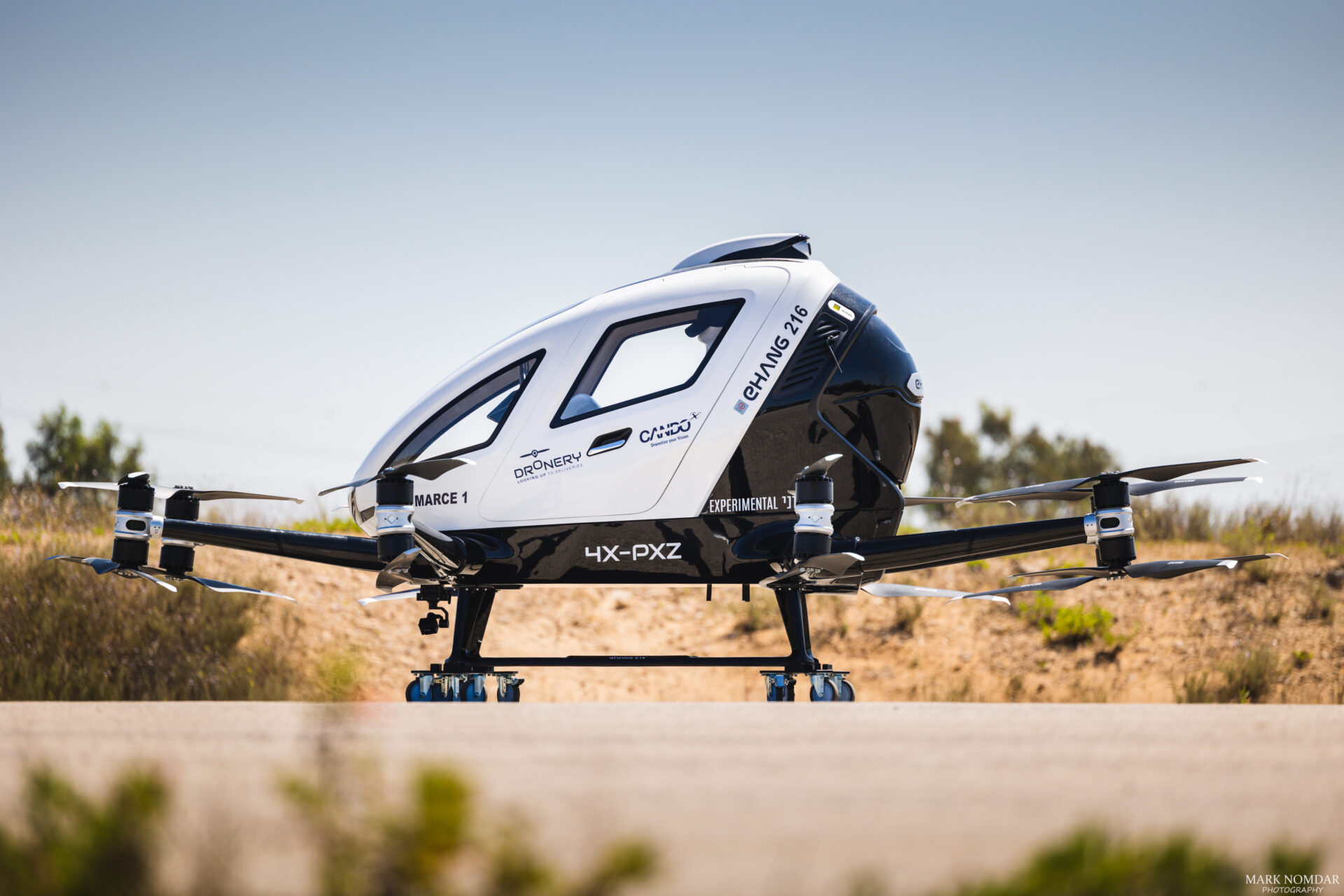
Mark Nomdar/Cando
Drone air-taxis conduct test flights over Jerusalem
Cando Drones expects to offer service to Tel Aviv in 2025 as Saudi Arabia, the UAE and Singapore make plans to fill the skies with air taxis
JERUSALEM – Perched on seven whirring propellers, the sleek black-and-white cockpit lifted vertically toward the sky and circled above the hills and valleys of the pine-filled Jerusalem Forest.
Two years from now, the remote-controlled aircraft could be ferrying passengers to Tel Aviv, Ben Gurion International Airport and suburbs teeming with tech startups as drone-taxi service is introduced to Israel. Among the objectives is to whisk travelers above the traffic jams that snarl Israel’s highways, and ultimately cut down the number of vehicles on the road.
In a combined effort by industry, government and regulatory authorities, Israel is conducting test flights to determine how it can safely unleash fleets of drones with fare-paying passengers into its Mediterranean skies. Saudi Arabia, the United Arab Emirates and Singapore are among a number of ambitious nations vying to be first with a pilotless air-taxi system operating at a competitive cost.
“We have built a concept of operation to reduce traffic around the world,” Yoely Or, CEO of Cando Drones, said during a recent demonstration for reporters of the aircraft’s capabilities on the grounds of Jerusalem’s Hadassah-Ein Kerem Hospital. Or said he expects the drone taxis to operate commercially by 2025 with more than 100 aircraft making short hops between Israeli metropolitan areas.
At the hospital, the helicopter-like EVTOL drone – electric vertical takeoff and landing – sat on a helipad waiting for its test flight. Inside are two comfortable-looking seats for passengers, although not much room for cargo. A drone pilot operates the aircraft sitting in a screen-filled command-and-control room in an office building miles away. As it took off, the drone’s lights turned green and it lifted silently to an altitude barely visible to a naked eye. After a 15-minute flight, it descended directly onto the helipad.
The taxi demonstration was part of Israel’s National Drone Initiative, which is holding flight tests and demonstrations in locations around Israel. The initiative is a partnership between government entities led by the Transportation Ministry, the Israel Innovation Authority, Ayalon Highways Ltd., and the Civil Aviation Authority of Israel (CAAI). The goal of the initiative is to support and promote drone flight through technology, regulation and infrastructure.
“What we’re looking at here is how… to move beyond transporting packages to transporting human beings,” said Daniella Partem, a senior director of the Innovation Authority. “We are looking to improve the economic viability of this model and advance connectivity in urban areas and further afield around the world.”
Partem said the drone taxis would also be made available for use in emergencies like earthquakes to bring relief workers and medicine to an affected area. But CEO Or sees the commercial possibilities, saying the drones will be just like ground taxis but much faster.
While saying fares for the air taxi service would be moderate, neither Or nor Partem would put a price on the rides. “There are no prices yet because the flights are still experimental,” the Innovation Authority said in response to questions. “The operating expenses are not yet based on regular activity.”
Each drone, manufactured by Guangzhou, China-based EHANG Intelligent Technology, can carry up to 220 kilograms (485 pounds) and fly 30 kilometers (19 miles), according to Or, who said they expect to increase the range within the next two years to make the 70-kilometer (43-mile) trip to Tel Aviv. The aircraft costs about $500,000 apiece, including import charges to Israel, and the company currently has two drones in testing. The company has raised $25 million from investors, including Israeli supermarket chain owner Rami Levy, who plans to use drones for grocery deliveries.
“Our vision for joint operations with Cando Drones is to create a system for operating an autonomous drone fleet for the purposes of security and delivery, from the stage of customer order up to delivery and mission completion,” Levy said.
Cando Drones, whose Dronery subsidiary runs the air taxi project, is not the only company in Israel developing air taxis. In June, Air One tested a similar all-electric two-seater drone taxi that can fly up to 160 kilometers (99 miles). Like Cando, Air One plans to operate a fleet of air taxis.
In the command-and-control center on the 17th floor of an office tower at Jerusalem’s Malha Technology Park, representatives from all of the parties in the initiative sat around a large table, surrounded by screens that show drone flights in real time.
“The challenge is not delivering food or medicine from point A to point B. The challenge is to make the skies over the city safe,” Libby Bahat, the head of aerial infrastructure at the Israeli Civil Aviation Authority, said. “Free-market competition will make the prices reasonable, but the challenge is to make the skies as safe as possible.”
Israel faces some significant security issues in drone aviation. Large swaths of the country along the borders with Jordan, Egypt, Lebanon and Syria are off-limits, as well as the sky over the Old City of Jerusalem.
“There are a few challenges to widespread operations of civilian drones,” Eyal Pinko, an expert in intelligence, cyberwarfare and national security at Bar-Ilan University in Ramat Gan, Israel, told The Circuit. “First is the cybersecurity issue and how to protect the drones from being hacked. Iran is trying to hack anything it can – water, electricity and transportation. Second is how to recognize the drone and see that it is not meant for terror activities. Thirdly is a question of real estate. Israeli streets have a lot of houses and electricity cables and in the populated cities, not much empty space.”
Pinko said that the three most advanced countries in civilian drone technology are Singapore, Saudi Arabia and the UAE. In Dubai, there is already a plan for air taxi stations and UAE Prime Minister Mohammed bin Rashid Al Maktoum, said the company will work with Santa Cruz, Calif.-based Joby Aviation.
In Singapore, where Pinko said regulatory structure is most advanced, a fleet of air taxis is set to start operating by the end of this year. Abu Dhabi-based Edge Group, a government-owned arms maker and defense conglomerate invested $14 million earlier this year in Israel’s High Lander Aviation, a platform that enables drone operations by managing traffic, aerial security, public safety and drone delivery networks.
“We see it as a strong strategic investment,” High Lander CEO Alon Abelson told The Circuit. “We had an option to work with VCs in Israel, but we see the Gulf and what is happening there as a clear target to lead the ecosystem in aviation.”


